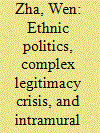| Srl | Item |
| 1 |
ID:
161560


|
|
|
|
|
| Summary/Abstract |
This article examines ethnic conflict and its impacts on intramural relations within the Association of Southeast Asian Nations (ASEAN). It suggests that ethnic politics at home often propels leaders to get involved in ethnic conflict elsewhere. In the ASEAN context, regional institutions, especially the principle of non-interference, mitigate the effects of ethnic politics and preclude the possibility of coercive intervention. The third state is more likely to appeal to facilitation or mediation. On the side of the host state, when the regime faces complex legitimacy crisis, it is more likely to reject the third state's involvement. Ethnic conflict is likely to cause diplomatic tussles between the two states. In contrast, when the regime of the host state enjoys a higher level of legitimacy, it is more amenable to the third party's mediation. Cooperation on conflict management will foster inter-state trust. This article illustrates the above mechanism by examining Malaysia's role in Thailand and the Philippines’ ethnic insurgencies.
|
|
|
|
|
|
|
|
|
|
|
|
|
|
|
|
| 2 |
ID:
140277


|
|
|
|
|
| Summary/Abstract |
The existing literature on foreign policy formulation suggests that individual leaders in small and politically unstable states exert a disproportionate impact on foreign policy-making. Some analysts further contend that personalized foreign policy decision-making is more likely to suffer from discontinuities. This article, however, argues that the foreign policies of small and politically unstable states exhibit considerable variation in terms of constancy. It does so by offering a comparative study of the foreign policies of the Philippines and Thailand towards China. It demonstrates that the Philippines’ policy towards China underwent significant changes in the last few years of the administration of President Gloria Macapagal Arroyo, and that bilateral relations deteriorated rapidly after Benigno Aquino III came to power in 2010. In contrast, Thailand has maintained a cordial relationship with China despite domestic political turmoil since 2006. This article suggests that neither the shift in the distribution of capabilities nor the presence or absence of territorial disputes sufficiently explains this variation. It argues that the personalization of foreign policy and economic dependence are two important factors that determine constancy and change in the foreign policies of small states towards major powers.
|
|
|
|
|
|
|
|
|
|
|
|
|
|
|
|
| 3 |
ID:
153128


|
|
|
|
|
| Summary/Abstract |
Existing literature contends that state capacity is an important variable that determines a country’s foreign policy behavior. Another strand of literature focuses on a more specific issue – the international relations of ethnic conflict, maintaining that domestic ethnic conflict may result in interstate conflict. In Southeast Asia, many weak states suffer from protracted ethnic conflict. However, few attempts have been made to assess the role of trans-border ethnic conflict in shaping interstate relations among the Association of South East Asian Nations (ASEAN) countries and the prospect of ASEAN security community. This article seeks to link the study of ASEAN with the issue of state capacity and internationalization of ethnic conflict. Deviating from existing literature, this article argues that the presence of trans-border ethnic groups in many ASEAN countries creates a common vulnerability, which in turn produces common interests and generates low levels of inter-state cooperation. Nevertheless, cross-border ethnic affiliations contribute to state leaders’ sense of insecurity and foment interstate mistrust. When the dynamics of ethnic politics in different countries interact, this interplay may add uncertainties to regional cooperation and inhibit the formation of a true security community. This article illustrates the above mechanism by examining the interaction between Malaysia and Thailand regarding the latter’s southern conflict.
|
|
|
|
|
|
|
|
|
|
|
|
|
|
|
|